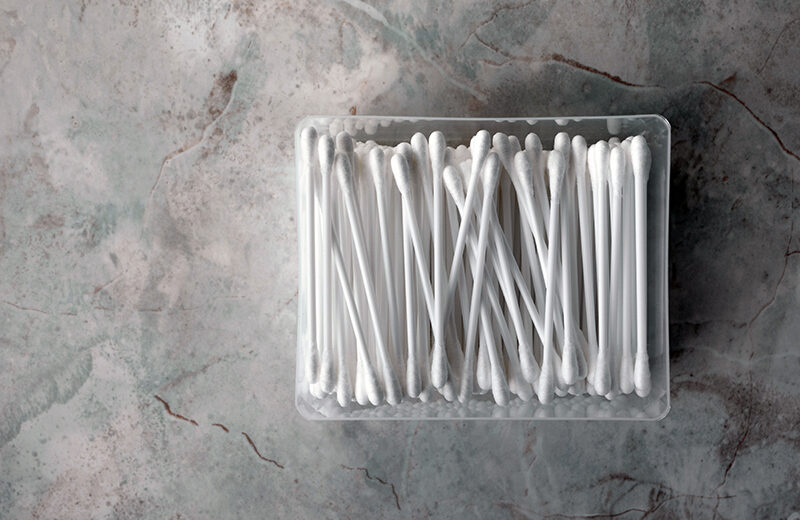It is a generally followed practice to keep Q-tips cotton swabs in the bathroom to clean out one’s ears. However, this seemingly essential task carries substantial risks. The American Academy of Otolaryngology cautions that using cotton-tipped swabs or other home instruments presents a severe risk of damage to the eardrum and ear bones. Accidental damage to the ears is a frequent outcome of using cotton swabs, with the most common cause of eardrum rupture being trauma resulting from such actions. If you often use Q-tips to remove earwax, this article answers frequently asked questions and highlights the potential dangers associated with this method.
Using Q-Tips to Remove Earwax: The Risks and Hazards
Earwax can be troublesome, causing hearing problems, itching, dizziness, and discomfort if there’s an excessive amount of it. However, you don’t need to clean your ears regularly. Earwax is usually healthy and beneficial for the ear. It helps protect against infections, dry skin, and unwanted dirt and debris.
What are the Risks of Using Q-Tips for Earwax Buildup?
Eardrum Rupture
Putting cotton swabs or other instruments in the ear is the most common cause of eardrum rupture. This can lead to painful injuries, infections, and hearing loss. It is essential to avoid inserting any foreign objects into the ear canal.
Infections
It is advisable to abstain from using cotton swabs in your ear as they may introduce harmful bacteria, dust, and dirt particles into your ear canal, potentially leading to infections.
Pain and discomfort
Even if you don’t fully rupture your eardrum, using cotton swabs can cause harm, such as scratches, inflammation, and pushing wax deeper into the ear canal, exacerbating discomfort.
Getting debris trapped in the ear
When inserting a swab, the cotton material can become loose and impacted, causing discomfort and pain, or could lead to hearing loss and increase the risk of infections.
How Frequently Should the Ears Be Cleaned?
Earwax cleaning is optional for most people. Our ears are self-cleaning organs, as the earwax collects dirt and debris and gradually pushes it out. Once it dries, it falls out on its own, preventing unwanted particles from entering our ears and reducing the risk of infection. However, cleaning your ears using a cotton swab can be dangerous as it can easily rupture your eardrum. Since the eardrum is exceptionally delicate, even gentle pressure from a swab can cause severe pain and clear fluid leakage from the ear. If it gets punctured, it can take a while to heal and may even result in conductive hearing loss. Therefore, it is essential to avoid using cotton swabs to clean your ears to maintain your ear health and prevent any damage.
Recommended Cleaning Tips for Earwax Buildup
While proper hygiene is crucial for maintaining good health, your ear is a delicate organ that can cleanse itself naturally in most cases. The ear canal’s self-cleaning mechanism involves the production of cerumen or earwax, which collects and traps dirt, debris, and bacteria that might enter the ear. Over time, the wax dries up and falls out of the ear canal, taking the trapped particles with it.
It is important to note that the ear canal is a sensitive part of the ear that could be injured by objects such as cotton swabs or other foreign objects. These items can push the earwax deeper into the ear canal, causing blockages, infections, and hearing loss. On the other hand, the outer ear, also known as the pinna, can get dirty due to sweat, dust, and other environmental factors. Cleaning the pinna is a simple process involving soap, water, and a washcloth while showering. However, it is essential to be gentle while cleaning to avoid causing any damage or irritation to the skin.
If you’re experiencing issues related to your ears, throat, or nose, it’s best to consult an ENT specialist who can appropriately help you. An ENT specialist can examine your ear and safely remove any earwax buildup.





